 A B C D E F G H I J K L M N O P Q R S T U V W X Y Z
A B C D E F G H I J K L M N O P Q R S T U V W X Y Z
To help with further browsing click on the large ‘Initial’ to return to the Early Gospel Singers Introduction, or click another initial to take you to details of more early gospel singers.
____________________________________________________________________________________________________________________________
| Name: |
Blind Joe(l) Taggart |
| Location: |
South Carolina |
| Born: |
1892 |
| Died: |
1961 |
| Biography Synopsis: |
Joel Washington Taggart (August 16, 1892 – January 15, 1961), usually known as Blind Joe Taggart, was an African American country blues and gospel singer and guitarist who recorded in the 1920s and 1930s. Though primarily a performer of evangelistic gospel songs, he also recorded secular music under a number of pseudonyms including Blind Joe Amos, Blind Jeremiah Taylor, Blind Tim Russell, Blind Joe Donnel, and possibly Blind Percy and Six Cylinder Smith.
Taggart was born in Abbeville, South Carolina, and by 1910 attended South Carolina Institute for the Deaf, Dumb and Blind in Spartanburg. By 1917, he was living and working as a musician in Atlanta, Georgia.
He married and moved to Chicago before 1921. He made his first recordings in 1926, for the Vocalion label. These were among the first recordings to be made of a so-called “guitar evangelist”. His recordings of religious songs under the name Blind Joe Taggart included “The Storm Is Passing Over”, “I Will Not Be Removed”, “Take Your Burden to the Lord”, and “I Wish My Mother Was On That Train”. As well as recording solo, he recorded duets with his wife Emma, and also recorded with James Taggart, presumed to be his son. Some of his recordings have been cited as having “traces of some of the earliest [blues] musical styles to have ever been recorded”.
As an itinerant blues performer, he was helped to and around venues by the young Josh White. According to White, Taggart was “tricky, nasty, mean”, and something of a fraud because he had partial vision rather than being completely blind. Records suggest that he wore one artificial eye, but had some sight in his other eye. According to record collector John Tefteller: “The labels knew they could sell more records by putting the word ‘Blind’ before the artist’s name… Black people were considered inferior. It was awful. They were being recorded, almost exclusively, by white producers. I don’t know if these singers really wanted to call themselves ‘Blind’ or not. Probably not.”
Taggart recorded secular blues songs under several pseudonyms, for different labels, including Paramount and Decca. The question of whether he was the performer credited as “Six Cylinder Smith” is unresolved. Eugene Chadbourne has commented: “When a bluesman assumed another name, the reason was not some kind of schizophrenia but usually an effort to do extra recording outside of a contract that had already been signed under one name. In the case of Taggart, he may have recorded secular blues numbers under the name of Smith, because in his former performing identity he was known as a gospel blues singer in the style of Blind Willie Johnson.”
Taggart’s last commercial recordings were issued in 1934. He remarried in Chicago in 1943, and made a religious test recording for the Presto label in 1948. He died of uremia in Presbyterian-St Luke’s Hospital, Chicago, in 1961, at the age of 68.
Source: Wikipedia |
| Recording career: |
1926 – 1934 |
| Most popular song(s): |
“The Storm Is Passing Over”,
“I Will Not Be Removed”,
“Take Your Burden to the Lord”,
“I Wish My Mother Was On That Train” |
| References / links: |
|
| Images: |
 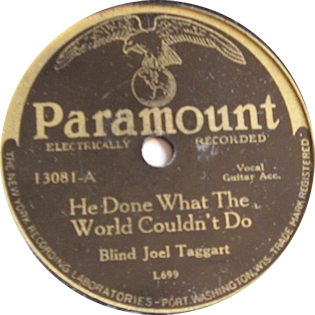
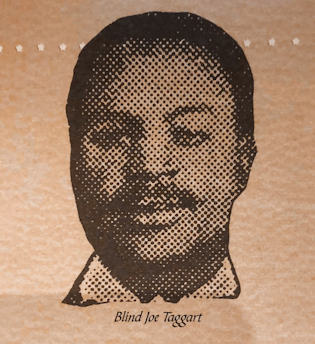 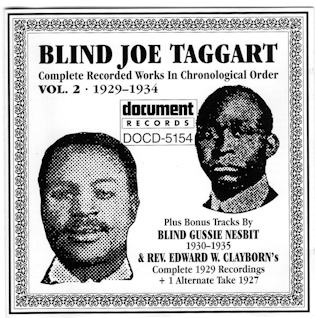
|
| Name: |
T. C. I. Women’s Four |
| Location: |
|
| Born: |
|
| Died: |
|
| Biography Synopsis: |
|
| Recording career: |
|
| Most popular song(s): |
|
| Musical Influences: |
|
| References / links: |
|
| Images: |
|
| Name: |
Tennessee Music & Printing Company Quartet |
| Location: |
|
| Born: |
|
| Died: |
|
| Biography Synopsis: |
|
| Recording career: |
|
| Most popular song(s): |
|
| Musical Influences: |
|
| References / links: |
|
| Images: |
|
| Name: |
Sister O. M. Terrell |
| Location: |
Atlanta, GA |
| Born: |
1911 |
| Died: |
2006 |
| Biography Synopsis: |
Born Ola Mae Terrell in 1911, the Atlanta native experienced a salvation experience at age 11 while attending a Holiness Movement tent revival, a type of gathering where worship songs were played on whatever musical instruments were at hand. By the Great Depression, she had become a blues-minded street musician who used her talents to evangelize passers-by, singing original compositions such as “God’s Little Birds,” to spread promises of both eternal security in Christ and more prosperous times here on Earth.
Terrell eventually went commercial and recorded several sides for Columbia Records. Her spiritual fervor remained intact in the studio, which made for some of the most moving recordings of the Delta blues and gospel genres. Many of Terrell’s songs, namely “The Bible’s Right,” find her playing guitar with open D tuning (referred to sometimes as Vestapol tuning), and a slide. On other songs, including “Life is a Problem” and “How Long,” she utilized cross-note tunings to convey messages of hope through the lens of unwavering faith.
When the 1960s folk revival gave new life to the careers of various practitioners of African American gospel, Terrell’s talents and contributions went largely unnoticed. What a missed opportunity, as Terrell’s gospel music would’ve sounded at home on the same festival stages as the Staples Singers or Sister Rosetta Tharpe.
Terrell’s music and ministry remained obscure through the final years of her life. An article by musicologist and author Bruce Nemerov for NPR covered the time he was asked by a music publisher to find Terrell and deliver royalties owed her from an off-Broadway play featuring “God’s Little Birds.” Nemerov’s search ended at a Conyers, Georgia nursing home, where Terrell spent her final years. She passed away in 2006 at age 95.
As an overlooked talent representing the musical approaches of pre- and post-War blues, the late Sister O.M. Terrell deserves to finally be remembered as a Southern blues and African American gospel innovator and legend. |
| Recording career: |
1948 – 1953 |
| Most popular song(s): |
“The Bible’s Right” |
| References / links: |
|
| Images: |
 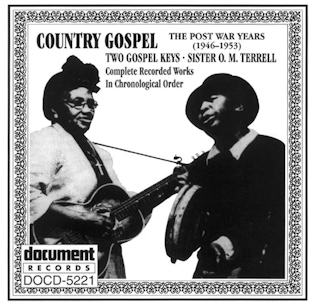 |
| Name: |
Texas Sanctified singers |
| Location: |
|
| Born: |
|
| Died: |
|
| Biography Synopsis: |
|
| Recording career: |
|
| Most popular song(s): |
|
| Musical Influences: |
|
| References / links: |
|
| Images: |
|
| Name: |
Sister Rosetta Tharpe |
| Birth Name: |
Rosetta Nubin |
| Born: |
20th March 1915, Cotton Plant, Arkansas |
| Died: |
9th October 1973, Philadelphia, Pennsylvania |
| Biography Synopsis: |
Sister Rosetta Tharpe was an American singer, songwriter, guitarist and recording artist. A one-of-a-kind pioneer of 20th-century music, Tharpe attained great popularity in the 1930s and 1940s with her gospel recordings that were a unique mixture of spiritual lyrics and early rock and roll accompaniment. As the first recording artist to impact the music charts with her spiritual recordings, Tharpe became the first superstar of gospel music and also became known as “the original soul sister.”
Willing to cross the line between sacred and secular by performing her inspirational music of ‘light’ in the ‘darkness’ of the nightclubs and concert halls with big bands behind her, Tharpe’s witty, idiosyncratic style also left a lasting mark on more conventional gospel artists, such as Ira Tucker, Sr., of the Dixie Hummingbirds. While she offended some conservative churchgoers with her forays into the world of pop music, she never left gospel music.
-Wikipedia (http://en.wikipedia.org/wiki/Sister_Rosetta_Tharpe) |
| Recording career: |
She began performing in 1919 at the age of 4 and her recording career spanned 1938 – 1973. |
| Most popular song(s): |
“Rock Me”, “This Train”, “Didn’t It Rain” |
| Musical Influences: |
She was a treasured early influence on iconic figures such as Elvis Presley, Little Richard, Jerry Lee Lewis, Aretha Franklin and Johnny Cash. |
| References / links: |
See Bibliography for “Shout, Sister, Shout! – The Untold Story of Rock-And-Roll Trailblazer Sister Rosetta Tharpe” |
| Images: |
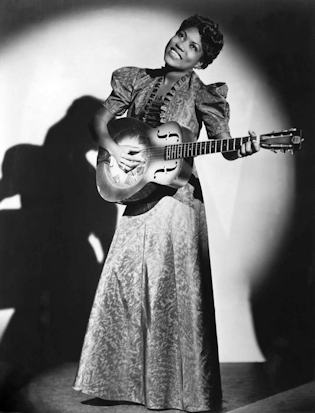 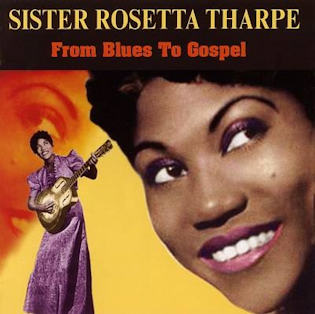
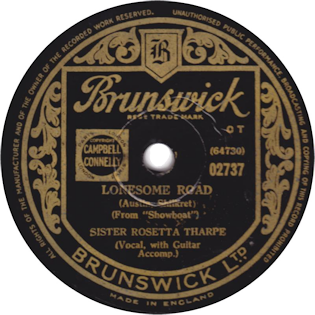 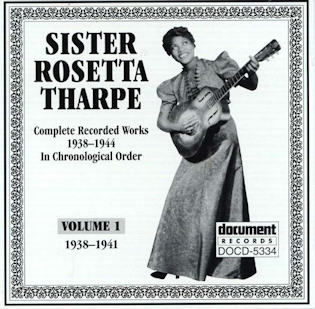
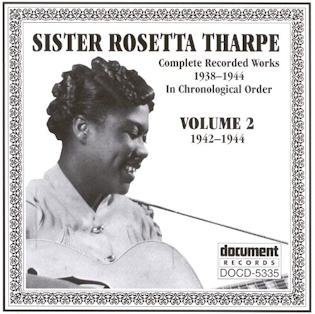 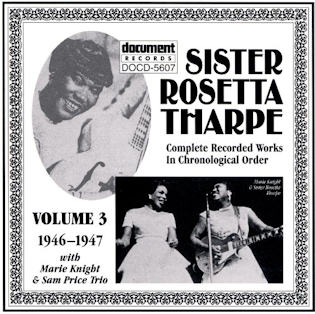
|
| Name: |
Rev. C. F. Thornton |
| Location: |
|
| Born: |
|
| Died: |
|
| Biography Synopsis: |
|
| Recording career: |
|
| Most popular song(s): |
|
| Musical Influences: |
|
| References / links: |
|
| Images: |
|
| Name: |
Rev. Charles Albert Tindley |
| Aka: |
“The Prince of Preachers” |
| Born: |
7 July 1851, Berlin, Maryland |
| Died: |
26 July 1933 |
| Biography Synopsis: |
Rev. Charles Tindley was a Methodist preacher and gospel music composer who educated himself, gaining experience from camp-meetings, and founded one of the largest Methodist congregations serving the African-American community on the East Coast of the United States. In the 1870s he established the East Calvary Methodist Episcopal Church in Philadelphia, where the congregation over time grew to a multiracial congregation of 10,000. The Church was re-named after his death as “TindleyTemple”. |
| Most popular song(s): |
“Leave It There” (recorded many times as “Take Your Burdens To The Lord”), “I’ll Overcome Some Day”, “What Are They Doing In Heaven Today?”, and “Stand By Me”. These songs and 30 others were published in his ‘New Songs of Paradise’ (1916), intended for Sunday Schools and social gatherings. The ‘New Songs of Paradise No. 6’ (1941) brought together all 46 of his published hymns. |
| Musical Influences: |
Recognised as one of the founding fathers of gospel music. His composition “I’ll Overcome Someday” is credited by some as the basis for the U.S. Civil Rights anthem “We Shall Overcome”. |
| References / links: |
Wikipedia (http://en.wikipedia.org/wiki/Charles_Albert_Tindley) |
| Images: |
|
| Name: |
Trumpeteers |
| Location: |
|
| Born: |
|
| Died: |
|
| Biography Synopsis: |
|
| Recording career: |
|
| Most popular song(s): |
|
| Musical Influences: |
|
| References / links: |
|
| Images: |
|
| Name: |
The Tuskegee Quartet |
| Location: |
|
| Born: |
|
| Died: |
|
| Biography Synopsis: |
|
| Recording career: |
|
| Most popular song(s): |
|
| Musical Influences: |
|
| References / links: |
|
| Images: |
|
| Name: |
Two Gospel Keys |
| Location: |
New York |
| Biography Synopsis: |
Emma Daniels (vocals, guitar), Mother Sally Jones (vocals, tambourine)
Itinerent singers of The Church of God in Christ (COGIC). |
| Recording career: |
1946 – 53 |
| Most popular song(s): |
Precious Lord
You’ve Got To Move |
| Musical Influences: |
“You Gotta Move”, or similarly titled variants, is a traditional African American spiritual. It was originally recorded by gospel vocal group The Willing Four in February 1944.
The song was recorded in December 1945 or January 1946 as “You’ve Got to Move” by the Two Gospel Keys, who were Emma Daniels (guitar and vocal) and Mother Sally Jones (tambourine and vocal), for Jubilee Records, and, although it was assigned a release number of Jubilee 2503, it does not ever appear to have been issued on Jubilee.
Disc Records of New York bought the Jubilee recordings from Jubilee and issued four sides in December 1947, including this release of Disc 5066. The excellent spiritual performance features the duo’s frevent, fast preaching vocal, as they declaim that, no matter your situation in life, successful or humble, the Lord will decide your fate of when you will die:-
The song was later recorded, amongst many others, by Mississippi Fred McDowell as “You Got to Move” on the album You Gotta Move [1965], but as a slow, evocative slide guitar blues rather than the previously prevalent fervent spiritual style of the song’s recordings. It was perhaps most famously recorded by the Rolling Stones on their album Sticky Fingers [1971], their version following Mississippi Fred’s arrangement. |
| References / links: |
|
| Images: |
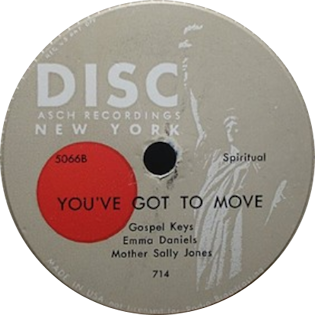 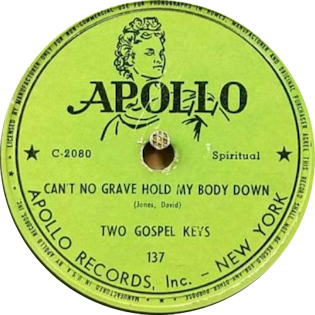

|
____________________________________________________________________________________________________________________________
 A B C D E F G H I J K L M N O P Q R S T U V W X Y Z
A B C D E F G H I J K L M N O P Q R S T U V W X Y Z
To help with further browsing click on the large ‘Initial’ to return to the Early Gospel Singers Introduction, or click another initial to take you to details of more early gospel singers.
____________________________________________________________________________________________________________________________
Please Note:
As this is a continuously developing website, several entries only give the names with no biographical details. Please be patient as these entries are included for completeness, indicating the details are ‘coming soon’ and will be added when time allows.
If there are any early (pre war) gospel singers missing from the lists that you think should be included, please email the details to alan.white@earlygospel.com. Thank you in advance for your assistance.
 A B C D E F G H I J K L M N O P Q R S T U V W X Y Z
A B C D E F G H I J K L M N O P Q R S T U V W X Y Z
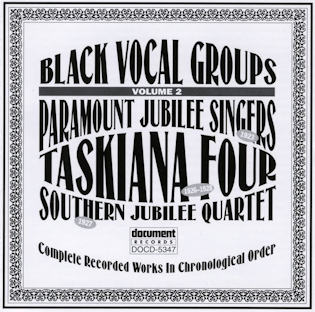
 A B C D E F G H I J K L M N O P Q R S T U V W X Y Z
A B C D E F G H I J K L M N O P Q R S T U V W X Y Z













